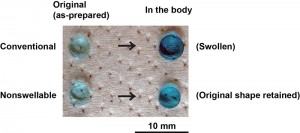New high-mechanical-strength materials for regenerative medicine First hydrogels that do not swell or lose shape in water

With the increasing awareness of the importance of regenerative medicine, hydrogels have been much attention as biomaterials in the last decade. In daily life, hydrogels are often found processed as foodstuffs such as tofus, agars, and aspics. In the fields of medical and hygiene products, hydrogels can be found in contact lenses and nappies. Hydrogels, due to their significant water content (about 90%) and structure similar to that of the body’s soft tissues, are promising candidates as biocompatible materials. In the body, however, hydrogels intake water from outside, and consequently swell, changing their initial shape; this results in the critical decrease in the mechanical strength.

© Takamasa Sakai. Swelling behaviour of hydrogels. While a conventional hydrogel (top) swelled in the body, the “nonswellable” hydrogel (bottom) retained its original shape even in the body.
Researchers ofProfessor Sakai’s and Professor Tei’s groups at the University of Tokyo Graduate School of Engineering Department of Bioengineering have, for the first time, presented hydrogels of which the swelling is suppressed by introducing thermoresponsive polymers, which shrink under physiological conditions, into hydrogels at any mixing ratio.
The hydrogels, which can be easily prepared by mixing two aqueous solutions including a solution of the thermoresponsive polymer, do not swell; rather, retain their initial shape and mechanical strength even in the body. Owing to the superior physical properties, the hydrogels may be used as scaffolding materials for pluripotent cells, which include induced pluripotent stem (iPS) and stimulus-triggered acquisition of pluripotency (STAP) cells, in the regenerative medicine field.
Paper
Hiroyuki Kamata, Yuki Akagi, Yuko Kayasuga-Kariya, Ung-il Chung, Takamasa Sakai,
““Nonswellable” Hydrogel Without Mechanical Hysteresis”,
Science, Vol. 343 no. 6173 pp. 873-875, doi: 10.1126/science.1247811.
Article link
Links
Graduate School of Engineering
Department of Bioengineering, Graduate School of Engineering
Chung Lab, Department of Bioengineering, Graduate School of Engineering







